- Home
- John Scalzi
The Last Emperox Page 5
The Last Emperox Read online
Page 5
“Yes, but aside from anything else, his death does me no good,” Grayland said. “He was meant to control the House of Wu and keep it in line. Now he’s dead and the members of the governing board are already fighting among themselves for control. If Deran is the only Wu cousin who is assassinated in the next few months, we should count ourselves lucky.”
“Technically you are the head of the House of Wu,” Attavio VI pointed out.
“Technically the emperox hasn’t tried to run the House of Wu for centuries,” Grayland said. “I was already out of my cousins’ good graces for cutting out the board and putting Deran solely in charge, and I got away with that only because Jasin Wu had moved against me, so I had pretext to be suspicious. Unless there’s obvious evidence someone on the board murdered him, I have no political pretext to be involved. If I insert myself again, the resistance is going to be impressive. I can’t afford that. Not now.”
Attavio VI cocked his head. “You have recently crushed a rebellion. You should have political capital to burn.”
Another smile from Grayland, this one rueful. “You would think that, Father. But as you said. Times are … turbulent.”
“As you knew they would be. As I warned you when you took on the crown.”
“Yes you did,” Grayland said. “You also said that you thought I wouldn’t be ready to deal with it all. Do you remember that?”
“I remember,” Attavio VI said.
“What do you think now?” Grayland held up her hand. “What I mean is, what would you think, if you could think, now?”
Attavio VI paused. Intellectually Grayland was aware that this pause was unnecessary, and inserted into Attavio’s simulation because the Memory Room was aware that at a moment like this, when two humans were having a conversation of this sort, there would likely be a pause while the responding human organized their thoughts to reply coherently. The pause was there to give Grayland a more psychologically authentic human experience. Nothing more.
It didn’t keep Grayland, in the space of that brief pause, from having a rush of feeling. A feeling she was being judged, and found wanting, and that her father—or the facsimile thereof—was trying to find a kind way of telling her that she wasn’t up to it, sorry.
“You’re not up to it,” Attavio VI said, bluntly. Then: “But then again, who could be?”
Grayland exhaled and in doing so was made aware she had been holding her breath. “Thank you for putting in that last part,” she said.
“I didn’t do it out of sympathy.”
“I know. You’re not programmed that way. Thank you anyway.”
“You’re welcome,” Attavio VI said. “With respect to your cousin’s assassination, what do you intend to do next?”
“Nothing directly,” Grayland said. “My security and the other investigators are already working on it. As I said, I have more pressing concerns.”
“You still came to talk to me about it.”
“I figured another emperox might know something about assassination.”
“I’m not sure that I told you anything you didn’t already know.”
“You didn’t,” Grayland agreed. “But you don’t exist. So you could be dispassionate about it. And I think you’re right. This was meant to send a message. We just need to decipher to whom.”
“That would depend on who was behind the assassination,” Attavio VI said. “And as you said, there are no obvious suspects.”
“There aren’t,” Grayland said. “But I can guess.”
Chapter 4
Nadashe Nohamapetan woke up full of hate, as usual, these days.
And who and what did she hate today? Oh, let us count them down.
To begin, she hated the stateroom she was in, “stateroom” being an excessively generous description of the box—three meters long, two meters wide, two meters high—that she now found herself living in. It was smaller than the prison cell she’d resided in for several months, and smelled worse. The stateroom featured a fold-up bunk that included straps to secure the occupant when the push fields went out, which was not infrequently. The mattress on the bunk was two centimeters thick and apparently made out of particleboard and despair, and the sleeping bag she was provided, despite assurances that it had been cleaned and sanitized, smelled like decades of lonely spacemen had diddled themselves in it and left the remains to stew.
The stateroom had no windows, no decorations, was apparently only fitfully connected to a ventilation system, and there was a sound—occurring every few minutes but maddeningly random within those bounds—from somewhere in the room that reminded Nadashe of a baby choking on a metal lolly. On the first night in the stateroom Nadashe searched in vain for the sound’s origin, growing slightly less sane the longer she did so, until she was finally reduced to zipping herself inside of her sleeping bag, hands over ears, huffing the residue of spaceman spunk until she more or less passed out.
It was, the captain had assured her, the best stateroom on the ship.
Which, to continue: She hated the ship the stateroom was in, the Our Love Couldn’t Go On, a freighter that plied a route between the planet Hub and Orleans, a medium-sized habitat that orbited Hub’s star, slightly closer than Hub itself. The Our Love was a century old if it was a day, and from the looks of it was maintained every decade or so if that; when Nadashe came on board she’d looked at the walls and bulkheads and wondered not whether she would catch diseases from them but which ones. Inasmuch as she had hacking bronchitis within a week of her arrival, she wasn’t wrong.
The Our Love was an independent freighter, which was a polite term for “smuggler.” It carried a thin veneer of legitimate inventory that would allow it access to berths at Hub and Orleans, and below that veneer lay a deep and limitless ocean of inventory both banal and insidious, all illegal. Cheap knockoffs, contraband, goods produced outside of legal monopolies, copyright and trademark violations, everything from guns to rum and back again. Everyone knew what the Our Love was and what it was doing, and also, no one cared, because the money was good and Captain Robinette spread it around, not to crew, of course, but to port officials and stevedores and bartenders and imperial tax assessors alike. Captain Robinette was very popular.
And to Captain Robinette, Nadashe was just another thing to be smuggled on the Our Love, with the exception that she was never offloaded, just charged an exorbitant rate for every leg of the journey, from Hub to Orleans and then back again. All Robinette was out was a stateroom, which had been used by the ship’s two unlicensed sex workers, Jeanie and Roulf, for their appointments—which, now that Nadashe thought about it, probably explained the sleeping bag. Jeanie and Roulf were reassigned to Doc Bradshaw’s stateroom, and Doc Bradshaw was left to hotbunk, which made her grumble fiercely at Nadashe every time she went to get medicine for her bronchitis.
Not that Nadashe had to worry about Doc Bradshaw ratting her out, either on Hub or Orleans. Like nearly every other crew member on the Our Love, Doc Bradshaw was hiding out from the law herself. The ship rumor was that she had stabbed a former lover square in the kidneys. Doc Bradshaw wasn’t really named “Bradshaw”—that was just the name she was given when she berthed on the Our Love, from a list of names Captain Robinette kept on a board. Bradshaw wasn’t really “Bradshaw,” Jeanie and Roulf weren’t really “Jeanie” and “Roulf,” and Robinette hadn’t been “Robinette” when he originally shipped out on the Our Love three decades earlier.
Even Nadashe had a ship name, for what good it would do in anonymizing the former fiancée of the crown prince of the Interdependency, who also happened to be the current Imperial Enemy Number One. Rules are rules, Robinette said, and dubbed her “Karen.”
Nadashe fucking hated that name. And hated the stupid rule that everyone got new names. And hated that the Our Love had given her bronchitis. And hated that while being on the Our Love kept her out of prison, being on the Our Love was itself a prison sentence, in that she couldn’t leave the ship, ever. Unlike “Doc Bradshaw” o
r “Jeanie” or “Roulf” or any other member of this ridiculous misnamed crew, the very second she popped her head out of the ship she would be spotted and taken. The Our Love crew could be relied on to not rat her out; no one else in the system had the same obligation.
Which was another thing: She hated being a fugitive at all.
Intellectually, of course, she could understand perfectly well why she was in this position. When one has fomented a planetary uprising, murdered one’s own brother while attempting to murder the emperox, escaped violently from prison and become complicit in a plot to overthrow royalty, obviously being a fugitive is not only a likely consequence, but honestly the best-case scenario. She got it.
But that didn’t make being sequestered in a smelly stateroom on a rusting ship filled with kidney-stabbing miscreants any better, either on an existential or a day-to-day basis.
There was no way Nadashe could avoid the fact that, in no uncertain terms, she had come down in the world. There was a time—not long ago!—when she was in line to be the imperial consort and mother to a future emperox. Even if that had not worked out perfectly (and as it turned out it hadn’t), she’d had a backup plan to install her brother Ghreni as Duke of End prior to the shift of Flow streams, assuring that after the shift the Nohamapetans, not the Wus, would be the new imperial line.
Except that hadn’t worked out either. Ghreni was still on End and may or may not have become the duke by now, but it turned out that the Flow streams were not doing what Nadashe had wanted them to do—that she had been told by her pet Flow physicist Hatide Roynold they would do—and that rather than shifting they were collapsing entirely. Nadashe had been furious when she learned that Roynold had been incorrect and would have had her dealt with, had her mother not already and inadvertently had her blown up in space, along with dozens of other people, in an ill-advised revenge attempt against the emperox.
Her mother!
Which was another thing she hated.
Not her mother—well, hmmm, let’s table that one—but that her mother, the Countess Nohamapetan, had fomented her own coup attempt against the current emperox. It was bad enough that the coup attempt had failed; but then, after it had failed, her mother decided that the smart thing to do was to shriek at the emperox that she, the Countess Nohamapetan, had murdered the former crown prince, whose death had been previously thought to be an accident.
It was, in fact, not the smart thing to do at all. Nadashe hated that not only was her mother in prison for treason and murder—the same prison that Nadashe had been in for treason and murder, how was that for family irony—but now the Nohamapetan family had been permanently removed from the administration of their house and its commercial monopoly, which was currently being run by a minor member of a much less successful noble house.
That would be fucking Kiva fucking Lagos, as the extraordinarily filthy-mouthed Kiva herself would no doubt put it, and who, incidentally, Nadashe entirely hated. Kiva and Nadashe had first crossed paths at university, where, save for the stretch of time Kiva had used Nadashe’s brother Ghreni as a sex toy, they’d mutually decided that the best thing for both of them would be to stay out of each other’s way—Nadashe because she didn’t want to spend any time consorting with her inferiors, and Kiva because she was too busy fucking her way through everyone else at the university and couldn’t care less if Nadashe was in her path or not.
This avoidance had also worked in the subsequent years as well, until Kiva had somehow apparently and literally banged her way into discovering Nadashe’s involvement in the assassination attempt against the emperox and the murder of her own brother. For this she was awarded temporary control of the local House of Nohamapetan business. This led to, shall we say, further issues as Kiva combed through the Nohamapetan finances with a fine-tooth comb, discovering rather a lot of incriminating money trails.
Kiva was foul-mouthed, low-class trash, as far as Nadashe was concerned, which would have been enough for Nadashe to hate her. But the fact that this foul-mouthed, low-class trash was now in control of her family company and fortune, while Nadashe was reduced to a 2×2×3-meter box while nursing a persistent cough, took things over the top for her, hatewise.
For all that, Kiva Lagos did not hold the top spot on the Nadashe Nohamapetan Hate List. Neither did the Our Love, its crew, her stateroom, her fugitive status, her mother’s stupidity or bronchitis. The top spot was held—and was held by a considerable margin—by the current emperox, Grayland II.
Of course there were all sorts of reasons for this. Starting with the fact that she was emperox at all, which had not been expected and which, due to the emperox’s heterosexuality and apparent unwillingness to be flexible about it, had definitively robbed Nadashe of her chances to marry an emperox or birth another. Continuing with the fact that the emperox then refused to seriously consider Nadashe’s brother Amit as a consort, shutting the Nohamapetans out of the running for marrying into the imperial line in any way. And then, that her response to the House of Nohamapetan’s repeated treacheries was to disenfranchise it entirely. Which, while eminently reasonable from a legal and dynastic point of view, was decidedly inconvenient for Nadashe, who was currently bearing the brunt of these decisions.
But more than anything else, Nadashe hated Grayland’s persistent unwillingness to just simply die, whether from bombs or runaway shuttlecraft or explosive decompression into the vast depths of space, or, hell, she was not picky, a wodge of pie crust stuck in the trachea or something banal like that. Pie crusts would do! Honestly, anything that dropped Grayland dead to the floor would be satisfactory to Nadashe at this point.
Nadashe was well aware that in having this opinion she could be accused of crossing fully into the category of one-dimensional villain with regard to the emperox. Her defense, such as it was, was this: how much the emperox had cost her. She had cost her a brother and a mother and a noble house and a future entwined with the imperial line. Whether the emperox had initially set out to do all these things—and the extent to which both Nadashe and her family had been the coauthors of their own misfortune—was immaterial to this. When everything came down to it—to the bare, rusting stateroom walls of it—Nadashe had very little left to her but hate for the emperox, and the continuing frustration that the aggravating naïf who held the title continued to exist.
At this point, if Nadashe did nothing else but bring down Grayland II, she’d consider herself even in the game of life.
But of course she—still!—had other, grander plans than that.
There was a knock on her stateroom door, and shortly after that the door moaned open to reveal First Officer Nomiek, who as rumor had it burned up several of his friends trying to make homemade, and evidently highly flammable, illegal substances in a bathtub back in his home system.
“Karen,” Nomiek said, and Nadashe visibly winced at this, “your visitor is here and in the mess. I’ll take you to him.”
“Thank you,” Nadashe said, coughed, grabbed her tablet and then followed Nomiek through the passageways of the Our Love, which smelled of metal and mildew and old.
“I was told I have to refer to you as ‘Karen,’” her visitor said, as she entered the mess. First Officer Nomiek scowled at the flippancy from the visitor and left. “Does this mean I need a code name as well?”
“Would you like a code name?” Nadashe asked, sitting at one of the cramped, dingy tables in the cramped, dingy room and motioning at her visitor to do the same.
“Not really,” her visitor said. “‘Proster Wu’ is a good name. I think I’ll keep it for now.” He sat, and looked around. “Not your usual surroundings, Karen.”
“It’s temporary.”
“Is it?”
“If you didn’t think so, you wouldn’t be here. Which reminds me, were you followed?”
Proster looked annoyed at this question. “I’m currently the highest-ranking surviving member of the House of Wu, save the emperox herself. Of course I was followed.” Nadashe tensed. Prost
er put up a hand. “But as far as anyone knows, the reason I’m here is to pick up a pallet of off-house brandy and port, which is currently being tended to by my driver. All very banal contraband. You’re safe.”
Nadashe relaxed. Then: “So now are you convinced that I am still a force to be reckoned with?”
Proster smiled. “I have to admit that it took me a minute to realize that you had poisoned Deran. I was expecting something else.”
“What else were you expecting?”
“Well, I don’t know,” Proster admitted. “But you were the one to send a shuttlecraft barreling into a cargo bay to kill the emperox. I suppose I was expecting something … louder.”
Now it was Nadashe’s turn to smile. She pulled out her tablet, fired up an application and then placed the tablet in front of Proster.
“What’s this?” he asked.
“It’s the trigger for the bombs I had put into the House of Wu board conference room,” Nadashe said. “They’ve been there for at least as long as the poisoned tea was in Deran’s assistant’s little drink stash.”
Proster looked doubtfully at the trigger app. “And how did you get those there anyway?”
“Come now, Proster,” Nadashe said. “You don’t expect me to give away my corporate secrets, do you?”
“Actually, if you want me to keep talking to you, I do.”
“Fine. When you get back, look for a member of your custodial staff who hasn’t come in to work since the day Deran died. When you find their name, have your people look into their background and whereabouts. You’ll discover that they don’t actually exist, despite having worked on your custodial staff for years.” Nadashe motioned around her. “This dingy little ship isn’t the only place where fake identities are the order of the day.”
“Corporate espionage,” Proster said.
“Oh, don’t pretend to be shocked. It’s not like the House of Wu doesn’t do the same damned thing.”
“Where is this person now?”
“Back home,” Nadashe said. “Or on their way, anyway. Everyone wants to be home these days. Apparently civilization is ending.”

 Lock In
Lock In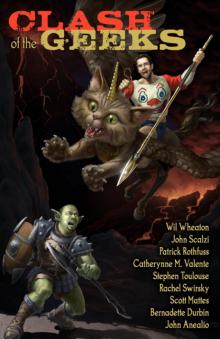 Clash of the Geeks
Clash of the Geeks Head On
Head On The Dog King
The Dog King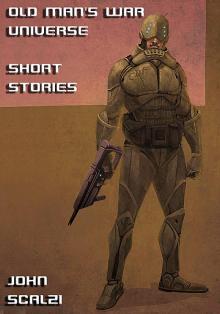 Old Man's War Universe: Short Stories
Old Man's War Universe: Short Stories The End of All Things
The End of All Things Tales From the Clarke
Tales From the Clarke The Human Division
The Human Division The Android's Dream
The Android's Dream An Election
An Election Zoe's Tale
Zoe's Tale Agent to the Stars
Agent to the Stars This Hollow Union
This Hollow Union The Gentle Art of Cracking Heads
The Gentle Art of Cracking Heads Old Man's War
Old Man's War The Tale of the Wicked
The Tale of the Wicked Your Hate Mail Will Be Graded: A Decade of Whatever, 1998-2008
Your Hate Mail Will Be Graded: A Decade of Whatever, 1998-2008 Judge Sn Goes Golfing
Judge Sn Goes Golfing The Back Channel
The Back Channel The Human Division 0.5 - After the Coup
The Human Division 0.5 - After the Coup Fuzzy Nation
Fuzzy Nation The Observers
The Observers This Must Be the Place
This Must Be the Place The Last Colony
The Last Colony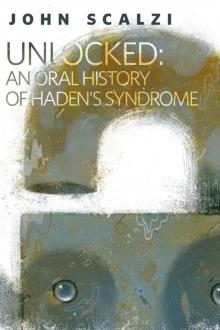 Unlocked: An Oral History of Haden's Syndrome
Unlocked: An Oral History of Haden's Syndrome A Voice in the Wilderness
A Voice in the Wilderness Redshirts
Redshirts The Collapsing Empire
The Collapsing Empire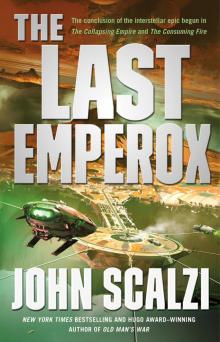 The Last Emperox
The Last Emperox The God Engines
The God Engines A Problem of Proportion
A Problem of Proportion THAT WAS THE MILLENIUM THAT WAS
THAT WAS THE MILLENIUM THAT WAS The B-Team
The B-Team The Sound of Rebellion
The Sound of Rebellion The President's Brain Is Missing
The President's Brain Is Missing Questions for a Soldier
Questions for a Soldier Walk the Plank
Walk the Plank We Only Need the Heads
We Only Need the Heads How I Proposed to My Wife: An Alien Sex Story
How I Proposed to My Wife: An Alien Sex Story Earth Below, Sky Above
Earth Below, Sky Above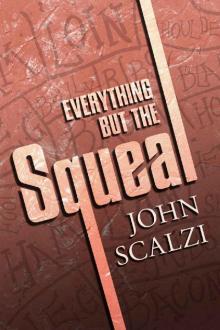 Everything but the Squeal
Everything but the Squeal Old Man’s War
Old Man’s War The Human Division #12: The Gentle Art of Cracking Heads
The Human Division #12: The Gentle Art of Cracking Heads This Must Be the Place thd-10
This Must Be the Place thd-10 A Voice in the Wilderness thd-4
A Voice in the Wilderness thd-4 The Observers thd-9
The Observers thd-9 The End of All Things: The Fourth Instalment
The End of All Things: The Fourth Instalment Earth Below, Sky Above thd-13
Earth Below, Sky Above thd-13 Zoe`s Tale вбиос-4
Zoe`s Tale вбиос-4 After the Coup
After the Coup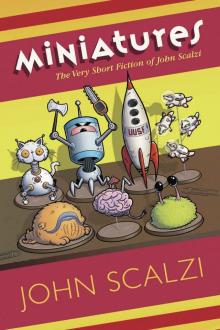 Miniatures: The Very Short Fiction of John Scalzi
Miniatures: The Very Short Fiction of John Scalzi The Last Colony вбиос-3
The Last Colony вбиос-3 Tales From the Clarke thd-5
Tales From the Clarke thd-5 Old Man's War omw-1
Old Man's War omw-1 The Human Division #8: The Sound of Rebellion
The Human Division #8: The Sound of Rebellion The Ghost Brigades omw-2
The Ghost Brigades omw-2 The Sagan Diary (old man's war)
The Sagan Diary (old man's war) The Sound of Rebellion thd-8
The Sound of Rebellion thd-8 The Human Division 13 - Earth Below, Sky Above
The Human Division 13 - Earth Below, Sky Above Head On_A Novel of the Near Future
Head On_A Novel of the Near Future The End of All Things: The First Instalment
The End of All Things: The First Instalment The B-Team thd-1
The B-Team thd-1 The Back Channel thd-6
The Back Channel thd-6 Walk the Plank thd-2
Walk the Plank thd-2 The Human Division #9: The Observers
The Human Division #9: The Observers The End of All Things: The Third Instalment
The End of All Things: The Third Instalment The Human Division #10: This Must Be the Place
The Human Division #10: This Must Be the Place The End of All Things #2: This Hollow Union
The End of All Things #2: This Hollow Union We Only Need the Heads thd-3
We Only Need the Heads thd-3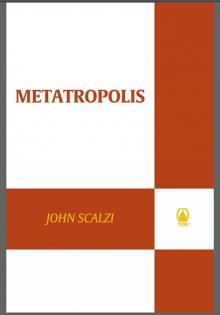 Metatropolis
Metatropolis The Dog King thd-7
The Dog King thd-7 The Consuming Fire (The Interdependency)
The Consuming Fire (The Interdependency) The Human Division #11: A Problem of Proportion
The Human Division #11: A Problem of Proportion